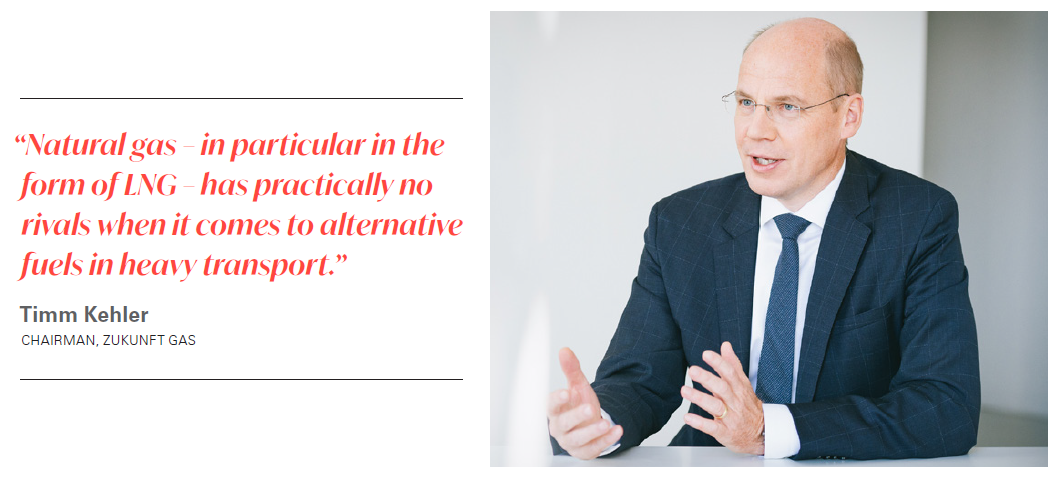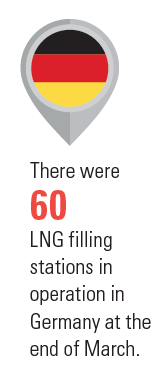German LNG trucks showcase natural gas strengths [Gas in Transition]
The LNG market in German road transport is booming. Last year, sales of LNG in heavy transport tripled in Germany, rising from 14,550 metric tons to almost 48,000 mt, saving 36,500 mt of CO2 emissions, German gas industry association Zukunft Gas reported in March.
At the end of the year, there were 46 LNG filling stations in Germany. By March 2021, the number had already risen to 60 – and two dozen more have been announced.
That is not all. Under a government support program to promote “energy efficient and/or CO2-poor commercial vehicles”, 87% of over 5,000 applications were for LNG trucks and another 12% for CNG vehicles. Applications for electric trucks amounted to no more than 1%.
Tractors
The main driver of the German LNG transport market, explains Timm Kehler, chairman of Zukunft Gas, is government support. There are several ways in which the government supports switching from diesel to LNG: tax and road toll exemptions and direct funding in the form of a €12,000-18,000 ($14,600-21,900) subsidy for the purchase of an LNG truck.
The number of heavy-duty gas trucks, weighing over 12 mt, rose 31% last year. As of January 1 2021, there were 498 LNG vehicles (including LNG only and LNG-diesel models) in stock. A year earlier there were only 142.
Even tractors are increasingly using gas: 1,400 new gas-fuelled tractors were registered in 2020, a record.
As of January 1, 2021, the number of natural gas vehicles was 100,807, which is 2.2% higher than in the previous year. The number of gas vehicles increased for the third year in a row.
Although the current incentives will end by the end of 2023, and will probably be made more limited, Kehler does not think this will change the market trend: “Government support kickstarted the market, but it will not be left there. Natural gas – in particular in the form of LNG – has practically no rivals when it comes to alternative fuels in heavy transport. Electric trucks are not feasible and hydrogen trucks are far from market ready.”
There are some experiments being conducted in Germany with trucks running on overhead lines, but Kehler does not believe this is likely to become a success. “The problem with overhead lines is that they make road transport inflexible.”
Media coverage
Ironically, the truck manufacturers showing the strongest support for LNG trucking in Germany are Scania, Volvo and IVECO – all non-German companies. “The big German manufacturers tend to support diesel,” says Kehler.
 The amount of gas sold in the transport market is rather limited – some 2-3 TWh of 900 TWh (roughly 90bn m3) of gas sold in Germany – and most of this is CNG. Nevertheless, Kehler believes the success of the LNG trucking market is important. “It gets a lot of media coverage. The LNG trucks are serving as ambassadors for natural gas.”
The amount of gas sold in the transport market is rather limited – some 2-3 TWh of 900 TWh (roughly 90bn m3) of gas sold in Germany – and most of this is CNG. Nevertheless, Kehler believes the success of the LNG trucking market is important. “It gets a lot of media coverage. The LNG trucks are serving as ambassadors for natural gas.”
This is useful, because there is ongoing debate in Germany about the role of natural gas in the energy system. The country is known for its ambitious climate policies. For Kehler, gas fits squarely into this climate space. “If we don’t switch to gas, we will get stuck in the status quo. Which means with diesel, coal, nuclear power, oil heating. Last year we had record sales of gas boilers as consumers switched from oil to gas. We also have a coal phaseout policy which will mean we need to rely more on gas. We as an industry need to be vocal about this.”
Green gas
To maintain the position of gas in the German energy market, the development of biomethane and bio-LNG is of crucial importance, says Kehler. Freight traffic is good for 24% of traffic emissions in Germany.
“We see a strong move towards green gas in transport. Some 60% to 70% of CNG currently sold is bio-CNG.”
Germany has 812 CNG filling stations, of which 435 offer CNG with biogas content and of which 417 are 100% bio-CNG stations. More than 50% of all petrol stations in Germany sell biogas.
Zukunft Gas is also promoting the use of bio-LNG in addition to LNG. “I expect to see similar growth in bio-LNG as in bio-CNG,” says Kehler. Shell, which has just started operating four new LNG service stations in Germany along important traffic routes and has 12 LNG stations in all, is building a biomethane production facility near Cologne that will become operational in 2023.
Shell is building a complete delivery chain infrastructure for bio-LNG with a capacity of 1mn mt/yr. “This is an important part of our mission to become a net zero company and make a contribution to the Energiewende,” the company has stated. Until production starts in Germany, Shell will source its bio-LNG from the Dutch company Rolande.
Overall Kehler is optimistic about the public perception of gas. Nord Stream 2 has led to “intensified public debate” over the role of gas, he says. Policymakers in Berlin, he notes, “have become even more aware that we need gas.”
He notes that at a German-Russian conference taking place in late April, the German Minister of Economic Affairs stressed that “Germany needs more gas, and needs Nord Stream 2.”
To ensure that gas can play a significant role in the transport sector, regulators, both at national and EU level, should acknowledge its benefits, Kehler says. For example, “it is important that the upcoming revision of CO2 standards for cars in the EU will be based on well-to-wheel calculations rather than just tailpipe emissions, as is currently the case. But I am optimistic about this.”
Kehler is also satisfied that in the new EU Taxonomy for Sustainable Activities, biomethane is recognised as climate-friendly. “That will help direct investment towards biomethane activities.”
|
Environmental gains According to Zukunft Gas, LNG offers a high emission avoidance potential. In terms of NOX emissions in particular, savings of up to 85% can be achieved even compared to modern Euro VI diesel trucks. Fine particulate matter emissions almost completely avoided. Noise emissions are around 50% lower. And there are CO2 savings of up to 15%. However, Brussels-based think tank Transport & Environment (T&E) disagrees with these assessments. In a report published in 2019, Do Gas Trucks Reduce Emissions, T&E concluded on the basis of on-road tests carried out by Dutch research institute TNO that LNG trucks emit more NOx and more particulate emissions than diesel trucks. It also argued that well-to-wheel greenhouse gas emissions (methane included) from LNG trucks are only marginally lower than from diesel trucks, and in fact even higher when compared to the most advanced diesel engines. According to Fedor Unterlohner, Freight & Investment Officer at T&E, the debate on the alleged environmental and climate benefits of gas in transport continues to this day. “We stand by our findings, which are based on research from TNO funded by the Dutch government.” Unterlohner says the German gas industry is promoting natural gas in transport with the promise that it will pave the way towards large-scale use of biomethane and bio-LNG, which has much more credible climate benefits. However, “we find this narrative misleading, because the amount of bio-based gas available is very limited and it’s very expensive. We favour electric trucks and fuel-cell (hydrogen) trucks as alternatives.” |




